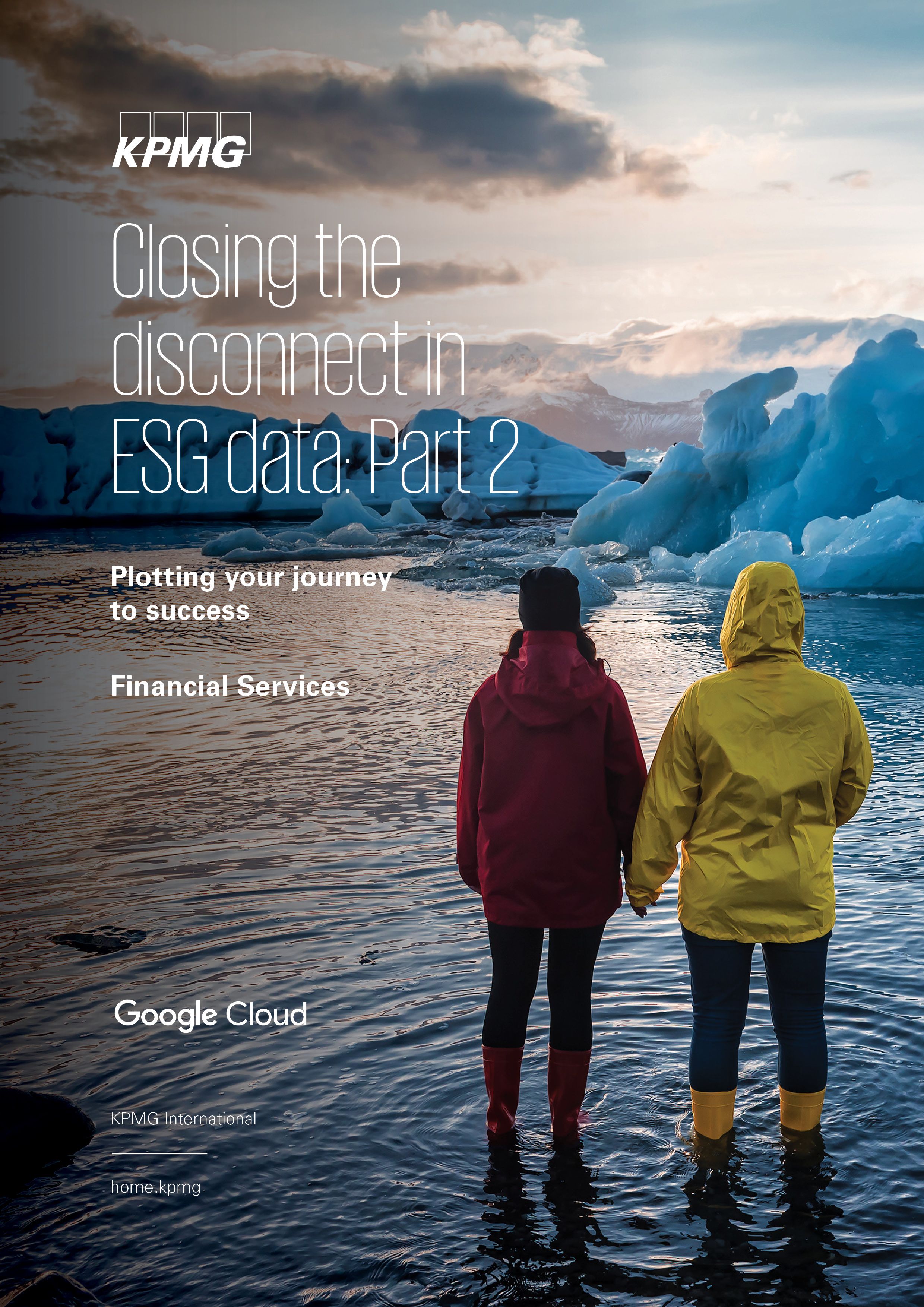The need for a step-change in the quality and quantity of environmental, social and governance (ESG) data is a movement with unstoppable momentum. Financial Services firms such as banks, insurers and asset managers continue to think about how to do good while also doing well, and deliberate some fundamental questions: What does good look like? How should success, and/or progress towards it be measured?
In the second of three in-depth analysis of the ESG data challenges and opportunities across the financial services sector, KPMG and Google Cloud discuss how to move forward and investigate how the evolution of regulation both raises the bar on ESG data while also enabling solution development; they consider the sources of the data and discuss a number of the technologies and solutions currently available. Missed the first report? That’s ok, you can read it here.
The quest for a robust ESG data solution
In a world where stakeholders are increasingly determined to hold financial services organizations accountable, the ability to provide a detailed and verifiable account of ESG performance is vital – both of their own performance and that of the organizations they finance. In parallel, regulators are also raising the bar on what constitutes detailed and verifiable as are the industry’s customers, employees and investors.
The implementation of new requirements across various jurisdictions, including the recent establishment of the International Sustainability Standards Board (ISSB) by the International Financial Reporting Standards Foundation (IFRS)) and the announcement of proposed disclosure rules by the SEC, should help financial services businesses to build robust and transparent datasets on key ESG issues and justify and account for its decisions and behaviors to key stakeholders, from regulators to employees.
Nevertheless, significant challenges remain, including a collective agreement on which data sources provide validation. The long-term goal of an ESG landscape where a standard universe of data is agreed upon as reliable, remains a distant one.
To produce meaningful and actionable insight and achieve their broader ESG goals, businesses will need access to new types of data that go well beyond those set out by the regulator, in addition to a set of new tools with which to interrogate and analyze that data.
In search of new datasets
Financial services organizations need a framework for a more universal data solution – a structure that goes deeper than the requirements of the regulators but also satisfies compliance processes.
By pulling together as much ESG data as possible from curated, private and public datasets – the ability to build a much more detailed and fulsome picture is greatly increased. However, without the right contextual data, meaningful ESG target setting, and insight is difficult to secure.
To bring clarity and build a wider picture, new solutions and tools that harness the full power of technology will be required.
New tools to drive ESG insight
Work on finding the tools and engines the financial services industry needs to make sense of the growing universe of ESG data is progressing at pace, with a promised capacity to provide far richer ESG insights than ever before. This capacity depends on platforms with the enormous computing power available from cloud-based solutions as well as a range of emerging and evolving technologies and examples that demonstrate how new tools can be harnessed for ESG projects are starting to emerge.
KPMG’s own ESG IQ platform powered by Google Cloud is a good example of what is possible – offering clients the opportunity to select and pool together both structured ESG reference data from multiple providers and unstructured data from a wide range of sources, including news reports, social media, blogs, etc. It can also extract ESG data from hidden data pools such as legal documents and trade confirmations, using natural language processing techniques.
One of the biggest challenges facing the financial services sector will be how to leverage these new tools and capabilities to serve their global customer base at scale.
Conclusion: Towards a reliable source of the truth
No-one is suggesting there will be a big bang moment for ESG data and sharpening the focus further will inevitably become more difficult. Unearthing and validating additional insight will require further resources including investment in the emerging technologies of data discovery and analysis.
Closing the data disconnect will not only help resolve the regulatory challenge but also help mitigate the risk, provide more insightful and strategic decision-making to deliver business better outcomes and help businesses to do well while also doing good.
KPMG and Google Cloud working to drive innovative business outcomes
KPMG and Google Cloud are working together to make new advances in ESG data science. Our aim is to drive innovative business outcomes as ESG scoring, reporting and assurance for financial services companies evolve at pace. With data and analytics as critical components to any ESG assessment, Google Cloud provides the engine needed to power more sophisticated reporting and scoring models.
More broadly, the combination of KPMG and Google Cloud can help drive business transformation across Asset Management, Banking, Capital Markets, Insurance, Private Equity and Payments. We can support your innovation, customer experience, security, and compliance needs. Contact us to learn more.
Contact us
Connect with us
- Find office locations kpmg.findOfficeLocations
- kpmg.emailUs
- Social media @ KPMG kpmg.socialMedia
The email address you've entered is already tied to an existing account. Please enter your password to log in.
KPMG thought leadership is always available to our registered users
You’ve successfully logged in.
Please close this pop-up to return to the page.
Please provide the following information to register.
Related content





